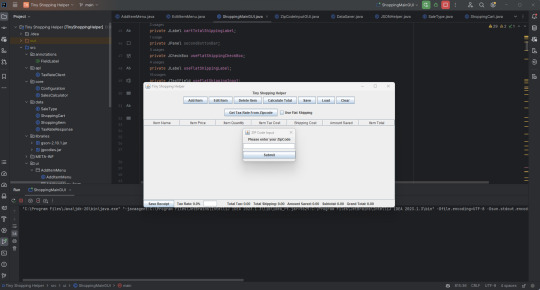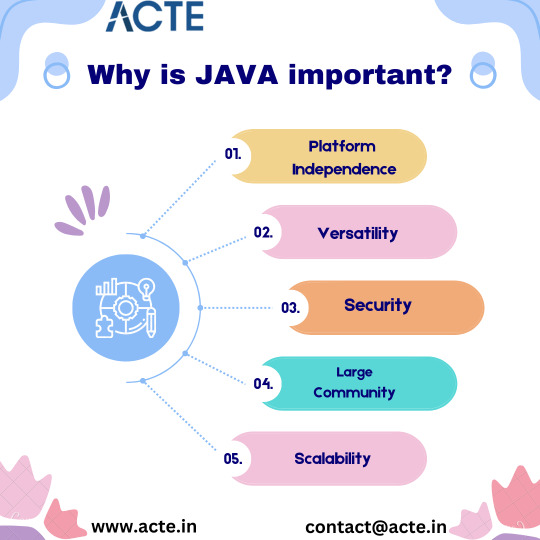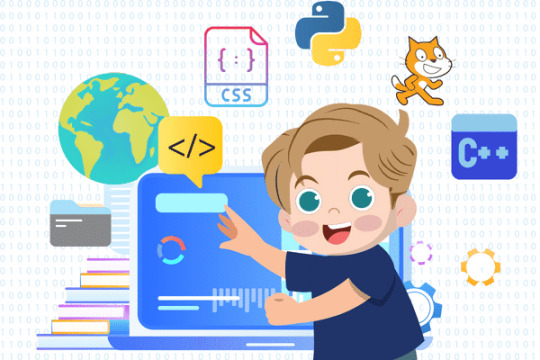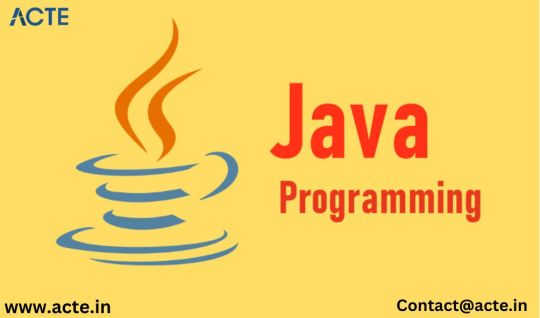#Javaprojects
Explore tagged Tumblr posts
Text
Overview of My Experience With my Java Project
I have done my course on Java this semester, and at the end we turn in a project we make that is of our choosing. I made a shopping helper application that tracks spending habits and how your recent shopping trips went. It's useful for keeping track of inflation too hehe.

I used an API to fetch the local area tax rate based on US ZIP codes (sorry to everyone outside the US). I also used GSON to write JSON files to save progress, because sometimes we all have to step away right? It also saves the receipt as a .txt or .csv file.
It's in total 3282 lines of code and the sale types was the worst part giving so many errors due to my dumb ass not knowing how to do math, but other than that I honestly just hate UI with a passion, so that wasn't fun.
Overall despite my initial hatred of Java, I think I can safely say while it is annoying, I will probably be okay working with it again. I don't love it or hate it.
Now next semester is when I'll shine. C# should be a breeze, and hopefully I'll learn something new. HTML/CSS should be okay although I'm debating switching it out for .net (don't ask why C# and .net are in 2 different classes, idk either). C++ with Unreal engine will be the scary one for me since I've heard horror stories about C++.
On a small note I hope we use C# 12 and if I do .net I hope it's .net 8
#self improvement#cosmickittytalk#codeblr#java#javaprogramming#javaprojects#college homework#college#Cs major#computer science#computer science major#software development#programming#learning programming
3 notes
·
View notes
Text
Unleashing the Power of Java: Your Guide to a Versatile Programming Language
Java: The Language of Digital Choreography
Programming languages are like the words we use to communicate with computers, and among these languages, Java stands out as a versatile and powerful tool. Imagine it as teaching your computer to dance to your tune, where your instructions are written in Java. But what makes Java so special, and why is it so widely embraced in the world of programming? Let's dive into the key reasons behind its importance.

1. Platform Independence: Java's Superpower
Java possesses a superpower—it can run on various computer systems without requiring modifications. How? Java programs are transformed into bytecode, a universal language understood by the Java Virtual Machine (JVM). This bytecode runs seamlessly on Windows, Mac, or Linux, making Java truly platform-independent.
2. Versatility: The Swiss Army Knife of Programming
Java is like a Swiss Army knife for programmers. It's not limited to one domain; you can use it to craft web applications, mobile apps, desktop software, and even embed it in small devices like smart thermostats. Its adaptability knows no bounds.
3. Security: A Robust Guardian
In an age where digital security is paramount, Java takes security seriously. It boasts built-in features that safeguard your computer and data from malicious software, providing peace of mind in our increasingly interconnected world.
4. Large Community: Your Support Network
The vast Java community is a valuable resource. With a multitude of Java developers out there, you can easily find help, access resources, and leverage libraries. If you encounter a coding challenge, chances are someone else has faced it and shared a solution.
5. Scalability: From Small to Massive
Java scales effortlessly. It's trusted by major corporations to power their colossal systems. Whether you're creating a small game or launching a massive e-commerce platform, Java can handle the challenge.

The Java Odyssey: Transforming Code into Digital Life
Understanding the inner workings of Java is paramount in the realm of programming. It unfolds as an intricate journey, a symphony of steps that bring your code to life, transforming instructions into digital ballet. Let’s delve deeper into this process:
1. Composition of Code: The Birth of Instructions
The journey commences with the composer, the programmer, crafting Java code that resonates with human understanding. It’s akin to writing the script for a grand performance, where every line of code becomes a note in the symphony of instructions.
2. Compilation: The Translator’s Artistry
Your code embarks on a transformative voyage known as compilation. This step resembles a skilled translator rendering a literary masterpiece into a universal language. The code metamorphoses into bytecode, a linguistic bridge that computers understand.
3. Bytecode: The Choreographer’s Notation
Bytecode emerges as the choreographer’s notation — a graceful set of instructions, akin to dance moves meticulously notated on a score. The Java Virtual Machine (JVM) is the dance floor, and bytecode is the choreographic masterpiece. It is platform-agnostic, a language that speaks fluently on any stage where a JVM is present.
4. Execution: The Grand Performance
The Java Virtual Machine takes center stage, assuming the role of the conductor and principal dancer. It orchestrates the grand performance by executing the bytecode on the target computer. This is where your program comes to life, faithfully translating your meticulously crafted instructions into tangible actions.
The Call to Adventure: Java Awaits
Now, are you ready to embark on the captivating adventure of Java? It beckons with the promise of exploring boundless possibilities and orchestrating digital feats. Java’s prowess extends across a myriad of applications, underpinned by its platform independence, fortified security, and the unwavering support of a vibrant community. If you harbor the eagerness to communicate with computers and guide them to perform incredible acts, Java stands as the perfect threshold.
Java is your gateway to a world where code transforms into enchanting performances, where the mundane becomes extraordinary. It is here that your journey unfolds, a journey of endless creativity and digital choreography that awaits your creative touch. Step onto the Java stage, and let your programming odyssey commence.
For those looking to deepen their understanding of Java, we strongly recommend exploring ACTE Technologies. Their qualified instructors can significantly enhance your learning journey, offering certificates and career placement opportunities. Whether you prefer online or offline access, ACTE Technologies provides a wealth of resources to help you master Java. Consider enrolling in one of their courses to embark on a step-by-step learning adventure.
#javacourse#javascript#javadevelopmentcompany#javaprogramming#javaprojects#best java developer jobs#best java training
4 notes
·
View notes
Text
📦 Build Your Own Stock Management System in Java!
Hey Java enthusiasts! 👩💻👨💻
Looking for a solid project to boost your portfolio or ace your semester submission? The Stock Management System Project in Java is the perfect fit. Designed using Core Java and MySQL, this project lets you manage products, employees, and billing all from a clean GUI. 💻✨
🔍 Features include:
Add/edit/view products
Company and category management
Employee login system
Billing and invoice generation
Secure manager/employee access
It's ideal for students and budding developers looking to get real-world experience with database-driven desktop apps.
👉 Check it out here: 🔗 Stock Management System in Java – With Source Code
🎥 And watch it in action: 🔗 YouTube Demo
The source code and MySQL database are included, and it even comes with a money-back guarantee + remote installation help! 🛠️
0 notes
Text
"Java in a Nutshell" by Benjamin J. Evans and David Flanagan is a concise yet comprehensive guide to the Java programming language. It serves as both a tutorial for beginners and a reference for experienced developers. The book covers the core features of Java, along with advanced topics, making it a valuable resource for anyone looking to master Java. Below is a user-friendly, step-by-step breakdown of the key outcomes and takeaways from the book, designed to help readers understand and apply Java effectively.
#Java#JavaProgramming#JavaInANutshell#JavaDevelopment#SoftwareDevelopment#ProgrammingBooks#JavaTutorial#JavaCode#TechBooks#JavaResources#JavaGuide#JavaBestPractices#JavaBasics#TechEducation#ProgrammingLanguages#JavaLearning#Java3#SoftwareEngineering#JavaProjects#JavaTips#JavaJVM#Coding#TechTutorial#JavaCommunity#JavaDevelopmentTools
0 notes
Text
💻 Need Ready-to-Use Programming Code?

🎯 Download or Buy 5000+ Verified Code Snippets, Scripts & Projects!
Welcome to Free Code Programming – your ultimate resource for high-quality programming solutions! Whether you're a student, freelancer, or pro developer, we’ve got you covered.
✅ 5000+ Free & Premium Codes
✅ Covering Multiple Languages (Python, Java, PHP, HTML, JS & more)
✅ Save time. Build faster. Code smarter.
✅ Perfect for assignments, freelance projects, or learning new tech!
📥 Browse & Download Now: https://freecodeprogramminglanguages.blogspot.com/
Join a growing community of smart coders who don’t waste time reinventing the wheel. 🚀
#FreeCode#ProgrammingCodes#CodeSnippets#DeveloperTools#CodingHelp#PythonCode#JavaProjects#PHPCode#SourceCodeFree#LearnToCode#FreelanceDev#CodeMarketplace#WebDevelopment
0 notes
Text

Engineering Java Projects for Final Years Students
Engineering Java Projects for Final Years Students is a versatile and powerful programming language that is used in many applications hence engineering students’ projects favours its use. It provides a sound environment for designing application oriented applications starting from ordinary tool utilities up to large business systems. All these can be learned and practiced through the domains areas such as web and mobile application development, data management services, and networking.
Some suggestions are Library Management System LMS, Ecommerce Platform, Chat Application and Network Securities System. Other complex concepts such as ML, block-chain or IoT solutions can also be developed grounded on Java frameworks like spring or Hibernate. These projects make it easier for students to develop their coding skills and incline themselves for the market challenges.
#engineeringprojects#javaprojects#cseprojects#managemntsystem#finalyearsstudents#networksecurities#takeoffedugroup#takeoffprojects
0 notes
Text
Decision Making Statement In Java
Elevate your Java programming skills by delving into the intricacies of decision-making statements. Our comprehensive guide not only covers the syntax of Java but also provides insights into crafting effective decision-making strategies. Learn to write clean, efficient, and logically sound code that stands out in the competitive programming landscape. Gain the confidence to tackle complex problems with precision and finesse through our in-depth exploration of decision-making in Java.
0 notes
Text
The Ultimate Guide to Java Online Compilers
Java Online Compiler :

In the ever-evolving world of programming, Java online compilers have emerged as indispensable tools. They offer accessibility, cloud storage, and collaborative coding, making them a perfect choice for both beginners and experts. Popular platforms like JDoodle, Repl.it, and IDEONE provide user-friendly interfaces and support multiple languages. With the ability to swiftly debug and share code, Java online compilers have revolutionized the coding experience. Whether you're learning Java or working on a team project, these online compilers empower you to code from anywhere. Discover the convenience and efficiency they offer and enhance your Java programming journey
#javacompiler#javaprogramming#javaskills#javalearning#javacoding#javaprojects#javatutorials#javadebugging#javacode#javadevelopment#javaonlinecompiler
0 notes
Text
What is a Constructor in Java

Introduction When it comes to understanding Java, one of the fundamental concepts you'll encounter is the constructor. Constructors play a pivotal role in object-oriented programming and are used to initialize objects of a class. In this blog post, we'll explore what is a constructor in Java, its types, and provide real-world examples to illustrate their significance.
How to define a constructor in Java? In Java, a constructor is a special type of method that is called when an object is created. Its primary purpose is to initialize the state of an object. A constructor is declared within a class and shares the same name as the class. It does not have a return type, not even void, and is automatically invoked when an instance of the class is created using the new keyword.
Types of Constructors Java supports several types of constructors:
Default Constructor in Java: If a class does not explicitly define a constructor, Java provides a default constructor with no parameters. It initializes instance variables to their default values (e.g., 0 for numeric types, null for objects).
Parameterized Constructor in Java: These constructors take parameters to initialize instance variables. They provide flexibility by allowing you to set initial values at the time of object creation.
Copy Constructor: A copy constructor creates a new object as a copy of an existing object. It is useful for duplicating objects and ensuring that they are distinct from the original.
Constructor Overloading: Just like regular methods, constructors can be overloaded. This means you can define multiple constructors in a class with different parameter lists, allowing for different ways of initializing objects.
Example of Constructor in Java Let's delve into some real-world examples to better understand the role of constructors in Java.
Parameterized Constructor Suppose you are developing a banking application. You have a BankAccount class, and you want to create instances with different initial balances. Here's a parameterized constructor that takes the initial balance as an argument:
public class BankAccount {
private double balance;
public BankAccount(double initialBalance) {
balance = initialBalance;
} // Other methods and properties here... }
Now, you can create bank accounts with different initial balances: BankAccount account1 = new BankAccount(1000.0); BankAccount account2 = new BankAccount(500.0);
What is Constructor Overloading?.. Read More
0 notes
Text
Java Assignment Help

With a team of experienced Java programmers and educators, our service of Java Assignment Help offers comprehensive assistance in various aspects of Java programming. This includes help with coding, debugging, problem-solving, and understanding complex Java concepts. Whether you're a beginner struggling with basic Java syntax or an advanced programmer tackling intricate Java projects, this service can tailor its support to your specific needs. we offers a user-friendly platform where clients can submit their assignments or questions and receive timely, well-structured solutions. It not only assists with immediate tasks but also helps individuals build a strong foundation in Java for long-term success in the world of programming.
#JavaProgramming#CodingAssistance#JavaHomework#ProgrammingHelp#JavaTutor#JavaLearning#CodeDebugging#ProgrammingSolutions#JavaDevelopment#JavaExperts#ProgrammingTips#JavaProjects#JavaCommunity#JavaLearningResources
0 notes
Text
Java Institute in Chandigarh
Welcome to the premier Java Institute in Chandigarh, a hub of excellence dedicated to shaping the future programmers and developers of the digital world. Our institute stands as a beacon of comprehensive Java education, offering a transformative learning experience that goes beyond the basics and delves deep into the intricacies of this versatile programming language.
At our Java Institute, we believe in fostering a learning environment that blends theoretical knowledge with hands-on practicality. Our meticulously designed curriculum covers a spectrum of Java concepts, from the foundational syntax to advanced topics like multithreading, data structures, and Java frameworks. We're not just teaching Java; we're shaping skilled Java artisans who can confidently craft solutions to real-world programming challenges.
0 notes
Text
#commonmistakeinjavaprogramming#javaprogramming#javaprojects#javaprojectswithsourcecode#javapejectsforbeginners#bestjavaprojectswithsourcecode
0 notes
Text
Java Programming: Scripting Your Code Success Story
Java is a versatile and widely-used programming language that's perfect for beginners. Whether you aspire to become a professional developer or just want to explore the world of coding, Java is a great place to start. In this blog post, we'll walk you through the best way to learn Java as a beginner, using simple words and practical tips.

Understand the Basics:
Before diving into Java, it's essential to understand some fundamental concepts of programming. Familiarize yourself with concepts like variables, data types, loops, and conditional statements. This will give you a solid foundation to build upon. Before you start writing Java code, it's crucial to grasp the fundamental concepts of programming. Get comfortable with variables, data types, loops, and conditional statements. These building blocks are the foundation upon which your Java knowledge will rest.
2. Setup Your Environment:
To write and run Java programs, you need a development environment. The most popular one is Eclipse or IntelliJ IDEA, but for beginners, even a simple text editor and the command prompt will suffice. To write and run Java programs, you'll need a development environment. While advanced tools like Eclipse or IntelliJ IDEA are popular choices, beginners can start with a simple text editor and the command prompt. The goal is to create a setup that suits your comfort level.
3. Object-Oriented Programming (OOP):
Java is an object-oriented programming (OOP) language, which means it's built around objects and classes. Learn about classes, objects, methods, and the principles of encapsulation, inheritance, and polymorphism.Java is an object-oriented programming (OOP) language, which means it revolves around objects and classes. Dive into the world of classes, objects, methods, and the core OOP principles: encapsulation, inheritance, and polymorphism. Understanding OOP is pivotal in becoming a proficient Java developer.
4. Practice Regularly.
Like any skill, practice is key to becoming proficient in Java. Start with small programs and gradually work your way up to more complex projects. Websites like LeetCode, Codecademy, and HackerRank offer coding challenges that can help you apply your knowledge.Practice makes perfect, and programming is no exception. Begin with small Java programs and gradually tackle more complex projects. Websites like LeetCode, Codecademy, and HackerRank offer coding challenges that enable you to apply your knowledge and enhance your problem-solving skills.
5. Read and Explore:
Invest time in reading Java documentation and tutorials. There are many online resources, books, and courses available. Websites like Oracle's Java Tutorials and Stack Overflow can be incredibly helpful for troubleshooting and expanding your knowledge.Immerse yourself in Java's documentation and tutorials. The internet is filled with resources, books, and courses dedicated to Java. Websites such as Oracle's Java Tutorials and Stack Overflow are invaluable for troubleshooting and expanding your understanding of the language.
6. Join a community:
Joining a Java programming community can be a valuable experience. Forums like Stack Overflow, Reddit's r/java, and GitHub offer opportunities to ask questions, share your knowledge, and collaborate on projects.Participating in a Java programming community can be a game-changer. Forums like Stack Overflow, Reddit's r/java, and GitHub provide platforms to ask questions, share your knowledge, and collaborate on projects. Learning from the experiences of others can accelerate your learning curve.
7. Build projects:
One of the best ways to learn Java is by building projects. Start with simple projects like a to-do list application or a calculator and gradually move on to more complex ones. This hands-on experience will deepen your understanding and boost your confidence.Hands-on experience is one of the most effective ways to learn Java. Start by creating simple projects like a to-do list application or a basic calculator. As you gain confidence, challenge yourself with more complex endeavors. Building real-world projects will deepen your understanding and boost your problem-solving skills.
8. Learn from Mistakes:
Don't be discouraged by errors and bugs; they are a natural part of programming. Learn from your mistakes and use them as opportunities to improve your skills.Errors and bugs are inevitable in programming. Instead of getting discouraged, view them as opportunities for growth. Debugging and troubleshooting will teach you valuable lessons and improve your coding skills over time.
9. Stay updated:
The world of technology evolves rapidly. Stay updated with the latest Java releases and new features. Follow blogs, subscribe to newsletters, and consider taking advanced courses to deepen your knowledge. The tech world evolves rapidly, and Java is no exception. Stay current with the latest Java releases and emerging features. Follow Java-related blogs, subscribe to newsletters, and consider enrolling in advanced courses to deepen your knowledge and keep pace with industry developments.

Learning Java as a beginner can be a rewarding journey. Remember to start with the basics, practice regularly, build projects, and seek help from the programming community. With dedication and persistence, you'll become a proficient Java programmer in no time. Happy coding!
Investigate ACTE Technologies if you want to deepen your understanding of Java. Their teachers are excellent teachers with a lot of experience. You have the option to learn Java in a conventional classroom setting or online. The Java training program at ACTE Technologies offers certifications and helps with job placement. In conclusion, learning Java requires perseverance, commitment, and regular practice. It's essential to be dedicated to developing your talents. You may master the language with consistent practice and use it to create a variety of projects and apps.
0 notes
Text
Why is the need for full stack developer increasing in the business world?
Who is a full stack developer?
An application or the website front-end and back-end are handled by a full stack developer. He or she oversees database design, user interface design, and development projects. He or she may collaborate directly with clients to comprehend project deliverables during the planning phase of a project.
A thorough comprehension of back-end and front-end technologies, as well as version control systems, APIs, servers, applications, security best practices, data structures and algorithms, and user interface (UI) design, is necessary for a full stack developer.
The developer should be well-versed in soft skills, project management, and DevOps, in addition to the aforementioned components.
What skills the companies are looking for in a full stack developer?
Developing and implementing user interfaces using HTML, CSS, and JavaScript.
Building server-side applications and business logic using programming languages like Python, Ruby, JAVA etc.
Creating and managing databases to store and retrieve data efficiently.
Integrating external APIs and services to enhance the functionality of application.
Collaborating with designers, various developer and stakeholders to plan and execute projects.
Ensuring the application is responsive, user-friendly, and optimized for performance.
Troubleshooting and debugging issues to maintain application functionality.
Staying up to date with the latest industry trends, technologies, and best practices.
Why to choose full stack developing?
Flexibility is a comprehensive understanding of web development, increased career opportunities, autonomy, enhanced problem-solving abilities, collaboration capabilities, and continuous learning are all benefits and the reason to choose becoming a full stack developer.
Full stack development is an alluring career choice for the people who enjoy working on a diverse amounts of projects, want job security, and are open to constant learning and development in the ever-changing web development industry.
Let’s look at some of the strengths that can help in becoming a full stack developer
Front-end Development: Proficiency in HTML, CSS, and JavaScript frameworks to develop responsive and interactive user interfaces.
Back-end Development: Strong knowledge of server-side programming languages to build robust and scalable applications.
Database Management: Experience in working with databases like MySQL, PostgreSQL, or MongoDB, including data modeling, querying, and optimization.
API Development: Familiarity with designing and implementing RESTful APIs to enable communication between different components of the application.
Full stack developers frequently collaborate closely with project managers, designers, and other stakeholders to comprehend requirements, provide technical guidance, and contribute to the project's overall success. To effectively deliver high-quality applications, they should have excellent communication, problem-solving, and time management skills.
Advantages of becoming a full stack developer
In a workplace where you have great UI abilities, you ought to have the option to rapidly make and present little models of the client. As you gradually find out about various advancements, you can help other co-workers when they're stuck.
A full stack engineer likewise decreases the time expected for project compatibility since they can carry out changes freely. All things considered, you don't need to stress over a front-end and a back-end designer planning their endeavors, since the full stack engineer has the whole venture under their influence.
The benefits of being a full stack developer include adaptability, a wider skill set, a variety of professional options, enhanced efficiency and autonomy, strong problem-solving skills, efficient teamwork and communication, continual learning, and entrepreneurial prospects. Furthermore, these advantages shows that full stack development is a desirable career option for those who enjoy working on a range of projects, seek career advancement, and thrive in a hectic and demanding setting.
You can look into several work prospects across industries and sectors as a full stack developer. There is a great need for full stack developers in the following common employment sectors:
The most typical job title for full stack developers is full stack web developer. Working on both front-end and back-end development duties, you will be in charge of creating and maintaining online apps while guaranteed smooth user experience and functionality.
Software Engineer: Full Stack Developers can work as software engineers and contribute to the creation of enterprise systems, mobile apps, and desktop applications.
Front-end developer: Full stack engineers who are knowledgeable in front-end technologies like HTML, CSS, and JavaScript etc
Back-end Developer: Full stack developers can also specialize in back-end development, focusing on server-side logic, databases, and APIs.
Developer Web Application: Full stack developers are well-suited for web application development roles, where you will be responsible for building, maintaining, and enhancing web applications using a combination of front-end and back-end technologies.
E-commerce Developer: E-commerce platforms require full stack developers to handle various aspects of online stores, including product catalogs, shopping carts, payment gateways, and user account management.
Industries that frequently hire full stack developers include:
Information Technology (IT) and Software Development
E-commerce and Online Retail
Financial Technology
Healthcare Technology
Education Technology
Media and Entertainment
Startups and Entrepreneurship
In conclusion, as businesses hunt for experts who can manage the complete development stack, streamline procedures, and improve project efficiency, the need for full stack developers is expected to continue to rise. You can take advantage of a variety of work chances in the rapidly growing tech sector by keeping your skills current and showing your ability.
#fullstackjava#fullstackcourse#fullstackwebdevelopmentcompany#education#educated black women#javaprojects#blog post#learning#students#software#softwarecourses
0 notes
Text
Effective Java by Joshua Bloch is a definitive guide for Java developers who want to write efficient, maintainable, and robust code. The third edition, updated for Java 7, 8, and 9, provides 90 best practices (or "items") that cover a wide range of topics, from language fundamentals to advanced techniques. Below is a step-by-step breakdown of the key outcomes and takeaways from the book:
#EffectiveJava#Java#JavaProgramming#SoftwareDevelopment#JavaBestPractices#ProgrammingBooks#JavaDevelopment#TechBooks#JavaTutorial#JavaTips#Java3#CodeQuality#JavaGuide#CleanCode#JavaLearning#TechEducation#JavaSkills#JavaDesignPatterns#JavaResources#ProgrammingBestPractices#SoftwareEngineering#JavaProjects#JavaCoding#TechTutorial#JavaCommunity
0 notes
Text
🎬 Movie Ticket Booking System in Java – With Source Code
If you're learning Java and want to build a fun, real-world project, check out this Movie Ticket Booking System built using Core Java and MySQL! It's a desktop app that lets users log in, view movie listings, book tickets, and even cancel bookings — just like a real cinema system.
It’s a perfect project for students or beginners looking to sharpen their skills in Java GUI (Swing), database (MySQL), and JDBC. Plus, it’s easy to run and comes with full source code, a database file, and setup help!
📥 Download here: 👉 Movie Ticket Booking System Project in Java
0 notes